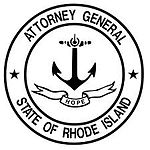| Attorney General of Rhode Island | |
|---|---|
 Seal of the attorney general of Rhode Island | |
| Department of Law | |
| Style | The Honourable |
| Term length | Four years Renewal once |
| Constituting instrument | Constitution of Rhode Island, Executive Law |
| Formation | 1776 |
| First holder | Daniel Updike |
| Succession | Election by joint session of Rhode Island General Assembly |
| Salary | $130,413 (2019) |
| Website | www |
The attorney general of Rhode Island is the chief legal advisor of the government of the State of Rhode Island and oversees the State of Rhode Island Department of Law. The attorney general is directly elected every four years. The current attorney general is Peter F. Neronha. [1]













